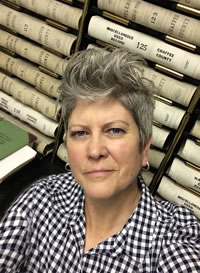It was a spectacular fall day in the mountain community of Salida, CO, as the Clerk and Recorder’s Office staff kept busy in the basement of the courthouse, processing mail ballots for the 2020 general election with Joseph Biden and Donald Trump at the top of the ticket.
Processing the ballots is a rigorous, detailed regiment that feels a little like balancing your checkbook to the penny every few minutes all day long. County clerks hire citizen election judges to partner with their staffs to run elections in the rush of the final few days.

Every voted ballot returned to the county has an electronic trail that can be traced back to the voter (but not how they voted) and if it was returned by mail, deposited into a drop box, or voted in person at a vote center.
On October 22, 2020, a large number of ballots arrived, promising that the basement crew would be working into evening hours. And suddenly, the beehive of activity abruptly halted. County Clerk Lori Mitchell checked a list of voters with signature verification issues and a name jumped out: Suzanne Morphew. She asked everyone in the basement to stop work.
Suzanne Morphew had not been seen for more than five months; she was reported missing on Mother’s Day 2020 when she allegedly went for a mountain bike ride and never returned. In the ensuing weeks, the entire county had been searching for clues as to her whereabouts. Suzanne Morphew’s photo was on a large banner at the local Walmart, handmade “missing” handouts were all over town, national stories popped up, online true-crime detective groups formed, podcasts were devoted to Suzanne’s mystery.
Yet Mitchell was staring at evidence that Suzanne’s ballot had been returned via mail. Every voter is required to sign their ballot to be matched against signatures on file. The signature line on this envelope had been left eerily blank. However, to the right of that blank line was a witness signature of Barry Morphew, Suzanne’s husband.
Mitchell quickly called the Chaffee County Sheriff’s Office, the District Attorney’s Office and the Colorado Secretary of State’s Office. Reassured that she was following protocol to legally isolate the ballot, the ballot processing continued. A deputy soon arrived to collect the evidence and asked several questions. Mitchell was able to print a report from the election system that answered exactly from where and when it had arrived at the courthouse. This ballot had been mailed from the Morphews’ home west of Salida.
When unopened voted ballots arrive in sealed boxes at the processing center, they are fed through a sorting machine in small batches so they can be located easily in case there is an issue to resolve. Ballots are separated from the envelope containing personal information, so the right to a private vote is preserved.
The machine takes an image of every signature that is electronically sent to bipartisan election judge teams to compare the signature to others on file. If either judge flags the signature, it goes on a problem list to be resolved. A letter is sent to each voter who has been flagged so they have the opportunity to resolve the issue and their vote can be counted. No reply ever came back from the letter to Suzanne Morphew.
On October, 22, 2020, Suzanne Morphew had not yet been declared dead. If she had, her name would have been removed from the statewide voter list that is matched regularly to death certificates. Colorado also matches a multi-state database for registered voters who die in other states and local obituaries to maintain accurate election records. Signature verification is yet another method to ensure the intended voter actually cast the ballot.
When Barry Morphew was confronted by investigators, he admitted voting the ballot because he “knew” Suzanne would have wanted to vote for Donald Trump and he wanted Trump to have the “extra vote.” He said he no idea it was illegal to cast a vote for a spouse. The district attorney’s office charged Barry Morphew with one count of forgery and one count of a mail ballot offense. He pleaded guilty to a forgery charge and was given a deferred judgment with supervised probation that ended last summer.
In the interim, he was arrested in May, 2021, for first-degree murder in connection with Suzanne’s death. Those charges were dropped in April, 2022, after prosecutors violated discovery rules and almost all expert witness testimony was blocked.
It is not uncommon to see news stories about “dead” voters who have allegedly cast a ballot in an election. Often, voters cast an early ballot or mail ballot and then die before election day. In other cases, household members decide to cast a deceased relative’s ballot without understanding the consequences. Sometimes, it is a case of mistaken identity when the deceased has a very similar name to someone else. Almost always, the news media stories mean the system worked and the ballot was not counted if it wasn’t cast legally.
In 2021, El Paso County investigated 759 names turned in by citizen groups as suspected “dead” voters. Only one was deceased and that ballot had been flagged during signature verification and turned over to the district attorney.
In September, 2023, Suzanne Morphew’s remains were found in nearby Saguache County and
she was legally declared dead. The details of her death remain a mystery.

Ellen Dumm is a communications consultant who has worked on Colorado elections issues
since 2010. She is also a part-time resident of Chaffee County.




